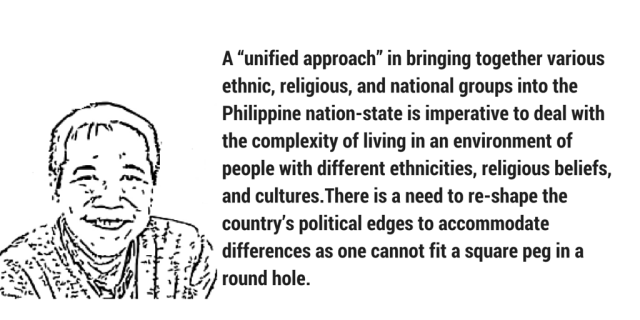Square peg in a round hole: Can the Bangsamoro suit into the Philippine unitary nation-state?
- Details
- Blog Content
- Hits: 693594
Rizal G. Buendia, PhD is a London-based independent consultant in Southeast Asian politics and international development.

Beyond the debate over the constitutionality of the Bangsamoro Basic Law (BBL) lies the fundamental and deep conflict between two modes of building the Philippine nation-state. This contradiction, evidently, is outside of the mind frames of constitutionalists and legal experts to resolve. Neither could it be addressed legally nor understood within the confines of existing statutes.
The Philippine general concept of statehood, i.e., notion of territorial jurisdiction, centralized government, system of governance, and political relationship between majority and minority peoples have been largely defined by centuries of colonial rule. Since the post-colonial years the Philippine unitary state has worked towards the integration, assimilation, and transformation of multiple ethnic identities into a single national identity—a downward exertion of state nationalism. A nationalism undertaken through the assimilation and integration of minorities into the majority’s culture, system of governance, and socio-economic structure.
Nation-building from the state’s perspective is conceived as a kind of super-ethnicity that supersedes all pre-existing ethnic identifications (in case permitted to persist, they are considered as variations on the national theme). Hence, while nationalism proclaims the intrinsic value of equality of people, the state compels them to succumb to the innate inequalities of statehood.
State nationalism is henceforth resisted by those groups who do not see themselves as part of the Philippine nation. They feel strongly against the erosion of their self-identity and see it as a gross violation of their political, economic, and cultural rights. The Philippine nation-state does not reconcile the contradictions between the majority and minority peoples but hides them.
The Bangsamoro struggle in particular, from the 1920s up to the present, is essentially a quest to the right of self-determination. It is the process of Bangsamoro (Moro Nation) nation-building; it has to defy the state and its authorities, and confront their armed forces. Separatist movements, like in other countries, have to demonise the threats of the state as the enemy and mobilises the masses to take collection action against such threats.
The diametrically opposing standpoint between the Philippine sovereign state and national liberation movements, either ethnic- or religious-based, flows from the inherent contradiction in the idea of a nation-state. The conflict generated by diverging perspectives has resulted in spiralling and unabated armed confrontation, hostilities, and violence between the forces of the state and separatist movements.
The clash of political interest seems to be irreconcilable with the former asserting its right to protect state’s territorial integrity and the latter upholding its claim as a “nation” under the principle of the right to self-determination; rights that are equally valuable and recognized by the international community.
The violent reaction of ethnic minority groups in general, apart from the Muslim minorities, against these policies is comprehensible as they endangered their collective survival. Accordingly, the undertaking to secede from the state becomes an inescapable recourse on the contention that separatists do not see a fair chance that their fundamental aspiration and interest, i.e., to be a part of the nation, would be hitherto accommodated under the state’s political system. The issue boils down, basically, to political and economic equity and social justice.
While state has, for a time, forged national unity, some of its initiatives have triggered political and social conflict and rebellion. State reform measures do not necessarily empower challenging groups but co-opt them into collaboration within the state power system itself. These actions undermined the process of nation building. The case of Moro National Liberation Front’s co-optation into the affairs of the State is a good example.
Historically, the Moro-State armed conflict was sparked more by the centralism of the state borne out of the nature of the unitary state, and inadequate democratic space that limits the self- governing power of the minorities, who consider themselves as a separate nation. The tenacity and seriousness of the conflict remains complicated with the unremitting inability of the state to substantially and decisively address, over a long period, its core causes insubstantial political autonomy; socio-economic grievances and deprivation; and perceived injustice, discrimination, and alienation of the people from the mainstream of Philippine political and economic development.
Approach
It is argued thus, that state’s nation-building project and independence movement’s state-building venture are endeavours to re-establish the balance disturbed by undue centralism of the unitary state on one hand and society’s counter-force to re-claim the power diminished by state’s unifying policies. Conferring a semi-sovereign status resembling a federal structure of governance to Muslim areas of Mindanao could be an option that the state can work on to further the nation-state building not only of the Philippines but also of the Muslims. However, this does not necessarily guarantee self-governance especially if power is exercised by traditional politicians.
A “unified approach” in bringing together various ethnic, religious, and national groups into the Philippine nation-state is imperative to deal with the complexity of living in an environment of people with different ethnicities, religious beliefs, and cultures. A more appropriate and long-term structural reforms in the country’s politico-administrative system is essential rather than simply applying rules and laws that suit the interest of state’s own concept of nation building. There is a need to re-shape the country’s political edges to accommodate differences as one cannot fit a square peg in a round hole.

